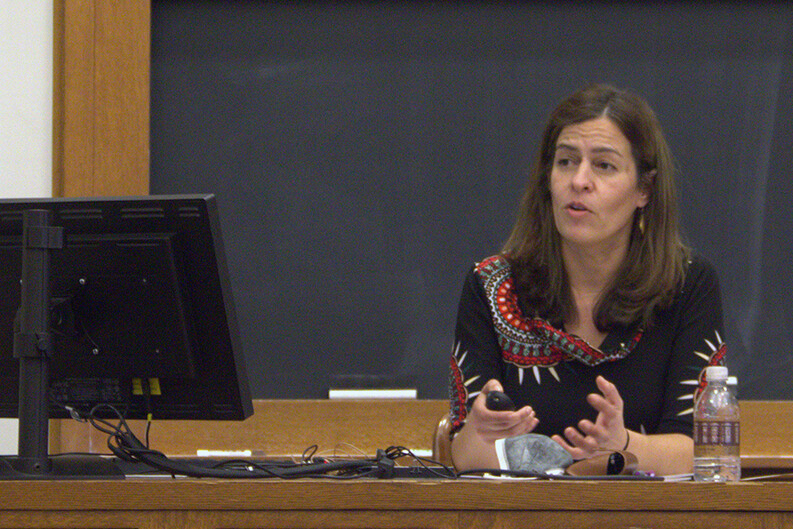Policing Globally Fails Human Rights Standards, Claudia Flores Finds

Claudia Flores, a Visiting Clinical Professor of Law at Yale Law School, led the Feb. 17 Human Rights Workshop. At the workshop, “The Failure of the World’s Richest Countries to Restrain Law Enforcement,” Flores explained her research evaluating global police adherence to international human rights standards on use of force.
Flores is a Clinical Professor of Law and the Director of the Global Human Rights Clinic at University of Chicago School of Law. She investigated a range of states’ use of “violence against their own citizenry,” particularly lethal violence. Flores noted that every state has “reserved the right” to commit violence against its citizens. However, she argued, that power implicitly threatens human rights, especially when state violence becomes lethal.
“When police departments can use force against their citizens that has the potential to end a life,” Flores said, some of the most fundamental human rights are at risk: the right to life; the rights to be free from discrimination, from torture, and from arbitrary arrest; and the rights to due process and free speech and assembly.
The United Nations has standards to protect those rights in the context of law enforcement, Flores explained. She cited four principles established by the U.N. Special Rapporteur on extrajudicial executions: legality, necessity, proportionality, and accountability. Together, these principles require that a state’s use of force must be based on a law that complies with international human rights standards, used as a necessary last resort in response to an immediate and particular threat, proportional to the threat the officer confronts, and reported to an external oversight body.
In collaboration with Amnesty International, Flores and the Global Human Rights Clinic at the University of Chicago undertook two studies of police use-of-force policies, first in the U.S., then globally. The results of the study were foreshadowed by obstacles in the research. “There was a pretty consistent lack of global transparency” about use-of-force policies, Flores said, which caused challenges for her team.
As Flores compared jurisdictions’ policies to the U.N. principles, “everybody failed these basic standards,” she said. Adherence to the legality principle was particularly poor, she noted.
“None had legislation that limits the use of legal force to an imminent threat and required police to report every use of legal force to an oversight body,” Flores said.
Some jurisdictions used “expansive, unclear language” to authorize lethal force, she added, such as permitting its use to defend so-called “public order” or “national security.”
These failures on paper correspond with serious rights violations in practice. Flores pointed out, for example, a global pattern of law enforcement targeting marginalized groups.
“Disempowered communities ... experience police violence in a different way than those in power,” she said.
Flores acknowledged that her research assumes that “law matters” whether police abuse the use of force.
“That’s not a given,” she said, adding. “How do we make these principles real?”


